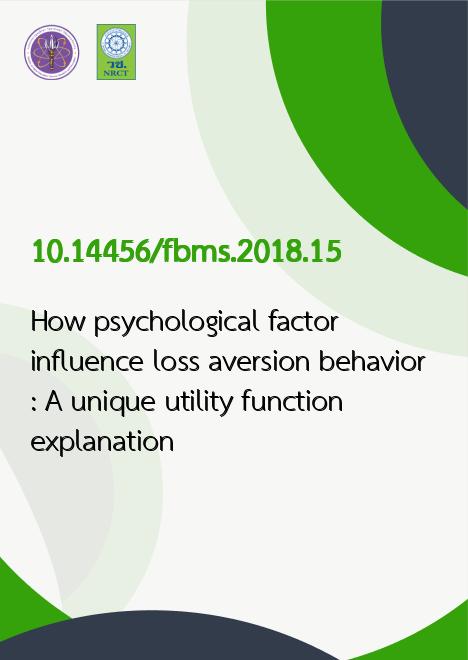
|
How psychological factor influence loss aversion behavior: A unique utility function explanation |
|---|---|
| รหัสดีโอไอ | |
| Creator | Zhongwu Li |
| Title | How psychological factor influence loss aversion behavior: A unique utility function explanation |
| Publisher | University of the Thai Chamber of Commerce |
| Publication Year | 2561 |
| Journal Title | UTCC International Journal of Business and Economics |
| Journal Vol. | 10 |
| Journal No. | 2 |
| Page no. | 101-118 |
| Keyword | Psychological factors, Switchable utility function, Loss aversion |
| URL Website | http://ijbejournal.com/ |
| Website title | ijbejournal |
| ISSN | 1906-5582 (paper) |
| Abstract | How psychological factor influence loss aversion behavior of individuals under uncertainty has been mostly tested for years. However, there is no any specific utility function can describe the way how psychological influence loss aversion behavior of individuals under uncertainty realistically. In current study, a once switchable utility function is presented. This positive odd n power plus linear utility function allows negative cost of game c, proxy of cost of game, to measures the difference between current wealth and certainty equivalent. As the certainty equivalent is difference between expected utility value and risk premium, so, the variable c can reflect both changes on current wealth and certainty equivalent continuously and avoid the subjective weighted probability bias existed in most expected utility functions. Most important point is that this utility function can be used to measure the psychological influence (individual's speed of adjustment to unexpected events and risk as feeling hypothesis) on loss aversion behavior of individuals to risks, represented by n in the utility function. Finally, this unique utility function can be employed empirically to measure both loss aversion behavior and psychological factors under the heterogeneity among individuals towards the risky choices. |